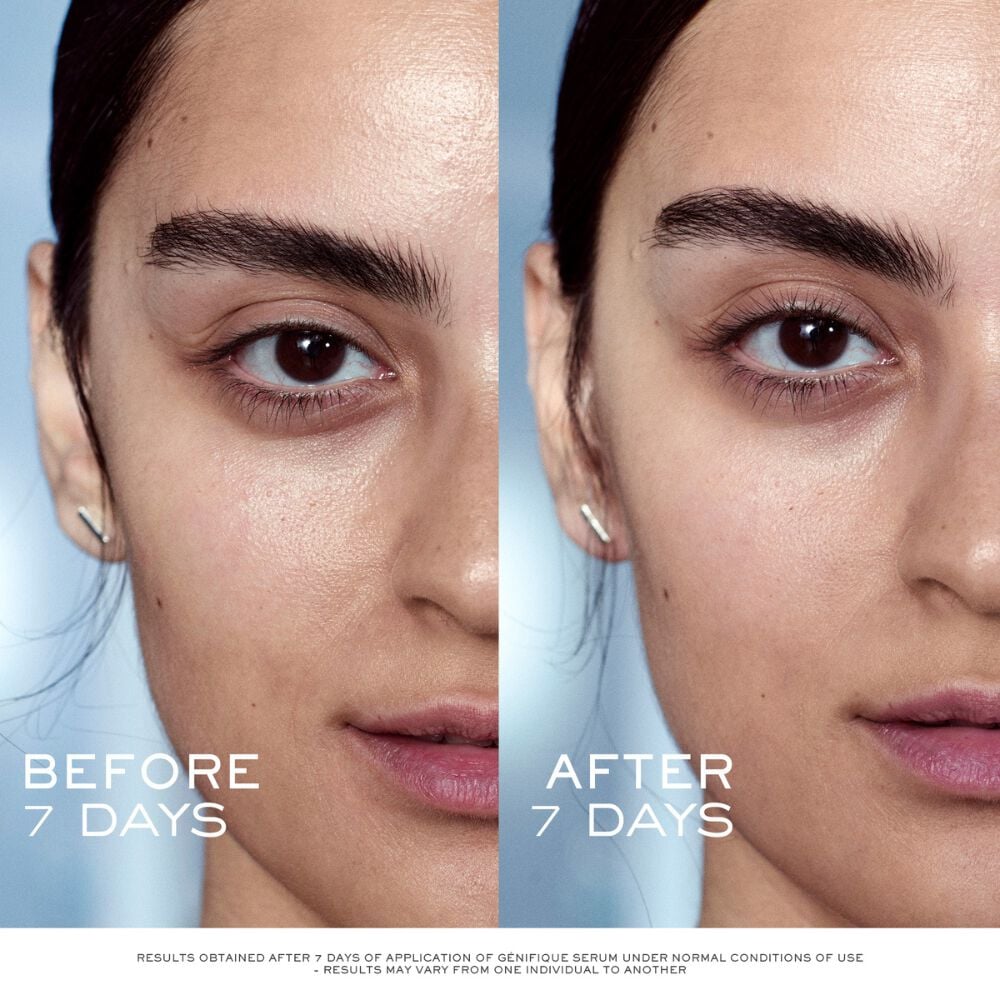Cómo el estrés puede provocar acné por estrés, arrugas y piel seca
Aprenda cómo el estrés puede desencadenar inflamación en la piel y provocar estrés por acné, líneas finas, arrugas y piel seca. Compre productos para el cuidado de la piel para abordar estas inquietudes en Lancôme.

¿Se siente estresado? No está solo. El estrés es común en la actualidad, tanto que la Asociación Estadounidense de Psicología lo ha llamado una crisis nacional1. El estrés se manifiesta de muchas maneras, desde afectar su estado de ánimo hasta interferir con el sueño, y las investigaciones muestran que también podría estar afectando la apariencia de la piel, contribuyendo al acné por estrés, la piel deshidratada o seca y los signos visibles de la piel envejecida, como las líneas finas y las arrugas. Esto es lo que debe saber.
¿Cómo afecta la piel el estrés?
Estar estresado desencadena una respuesta inflamatoria en todo el cuerpo, y la piel no es la excepción. De hecho, hay un grupo completo de problemas de la piel conocidos como afecciones inflamatorias de la piel, que muestran cuán cerca está la conexión entre los dos2.
Sarpullidos de estrés
Para empezar, hay acné por estrés. Ya sea que se trate de un brote en la frente o nuevos granos en el mentón, los brotes de acné pueden vincularse con sus niveles de estrés. Existen algunas posibles razones para esto: El estrés emocional puede aumentar los niveles de hormonas que empeoran el acné, mientras que otras hormonas y péptidos relacionados con el estrés pueden conducir a una mayor producción de aceite (lo que le da una mayor probabilidad de obstruir los poros)3. Por último, pero definitivamente no menos importante, el estrés también puede interferir con la cicatrización de heridas, lo que significa que cualquier erupción de estrés existente también puede tardar más en desaparecer.
Piel seca o deshidratada
Sentirse estresado también puede afectar la función de la barrera cutánea. Se ha demostrado que el estrés ralentiza la recuperación de la barrera cutánea y aumenta la pérdida de agua transepidérmica (también conocida como evaporación natural de la humedad de la piel).4 La forma exacta en que lo hace aún no está clara, pero los investigadores adivinan que puede reducir los lípidos que son tan importantes para mantener la barrera cutánea adecuadamente fortificada, y tienen el trabajo esencial de ayudar a la piel a retener la hidratación.5 Bajo estrés, entonces, existe una mayor probabilidad de experimentar piel seca y deshidratada (que no son lo mismo, por cierto).
Líneas finas y arrugas
Por último, el estrés puede acelerar los signos visibles del envejecimiento de la piel, como las líneas finas y las arrugas. Estar estresado conduce a la liberación de lo que se conoce como las “hormonas del estrés”, cortisol, epinefrina y noradrenalina. Se ha demostrado que dañan el ADN e interfieren con su reparación6, lo que elimina una línea clave de defensa contra el envejecimiento de la piel. Y más investigaciones demuestran que el estrés puede provocar la liberación de radicales libres en la piel7, que son las mismas moléculas formadas por la exposición al sol y la contaminación que puede descomponer el colágeno y la elastina, lo que provoca manchas oscuras y daña las células.8
¿Cuáles son los signos visibles del estrés en la piel?
Si estás estresado, tu piel dejará algunas pistas bastante importantes. Los granos en el mentón, las mejillas y la frente pueden aparecer, incluso en aquellos que generalmente no son propensos a las erupciones. También existe la posibilidad de que la piel esté seca y deshidratada, posiblemente aún más si usas productos para el cuidado de la piel para combatir el acné estresante. Y, por último, es posible que vea que se desarrollan líneas finas y arrugas prematuras.
Cómo cuidar la piel estresada
Claramente, estar estresado tiene un efecto multifacético en la apariencia de la piel, por lo que un enfoque estratégico puede ayudar. Después de la limpieza, dé palmaditas con un tonificador relajante como Tonique Confort. Combinada con ácido hialurónico y miel de acacia, la fórmula elimina las impurezas de la superficie de la piel y mejora la hidratación de la piel. Posteriormente, aplicar un suero hidratante como el Suero facial Advanced Génifique puede ayudar a hidratar la piel y a mantener una barrera cutánea saludable.
Luego, humecta diariamente con Hydra Zen Anti-Stress Gel Cream, un humectante liviano y sin aceite con propiedades no comedogénicas (lo que significa que no obstruye los poros) que actúa para apoyar la función de barrera de la piel y reducir los signos de fatiga. Contiene el exclusivo extracto de rosas de Lancôme, conocido por sus propiedades calmantes, así como un extracto de moringa rico en antioxidantes9 para brindar una piel radiante y cómoda.
Por último, pero no menos importante, intente encontrar maneras de controlar el estrés durante todo el día, ya sea respirando profundamente, comunicándose con su programa de televisión favorito o dedicando tiempo al cuidado personal, como su rutina diaria de cuidado de la piel. El estrés es una situación de adentro hacia afuera, por lo que vale la pena abordarlo de ambas maneras.
https://www.apa.org/news/press/releases/stress/2020/report-october
https://dermnetnz.org/topics/inflammasomes-and-inflammatory-skin-diseases/
https://jamanetwork.com/journals/jamadermatology/fullarticle/479409
https://pubmed.ncbi.nlm.nih.gov/11176661/
https://www.ncbi.nlm.nih.gov/pmc/articles/PMC4082169/#__sec12title
https://pubmed.ncbi.nlm.nih.gov/17459596/
https://pubmed.ncbi.nlm.nih.gov/24011311/
https://www.ncbi.nlm.nih.gov/pmc/articles/PMC3299230/
https://www.ncbi.nlm.nih.gov/pmc/articles/PMC5745501/#sec2-antioxidants-06-00091title







